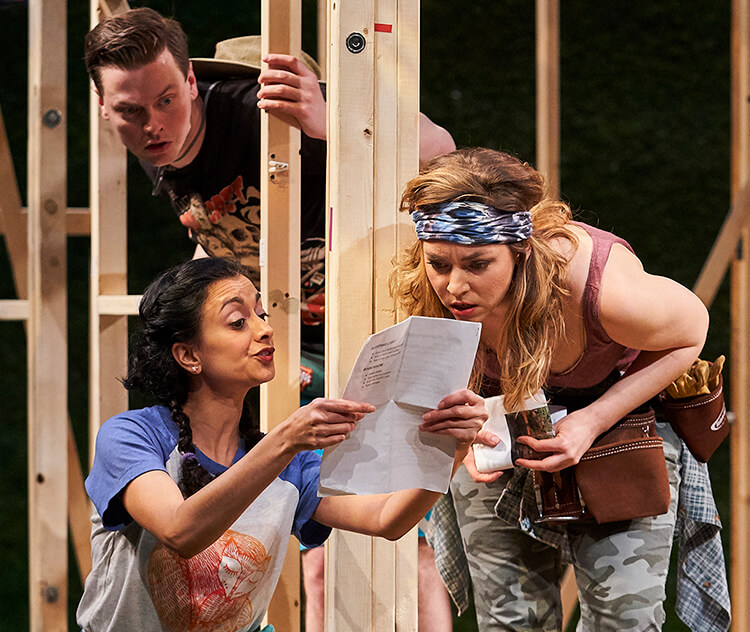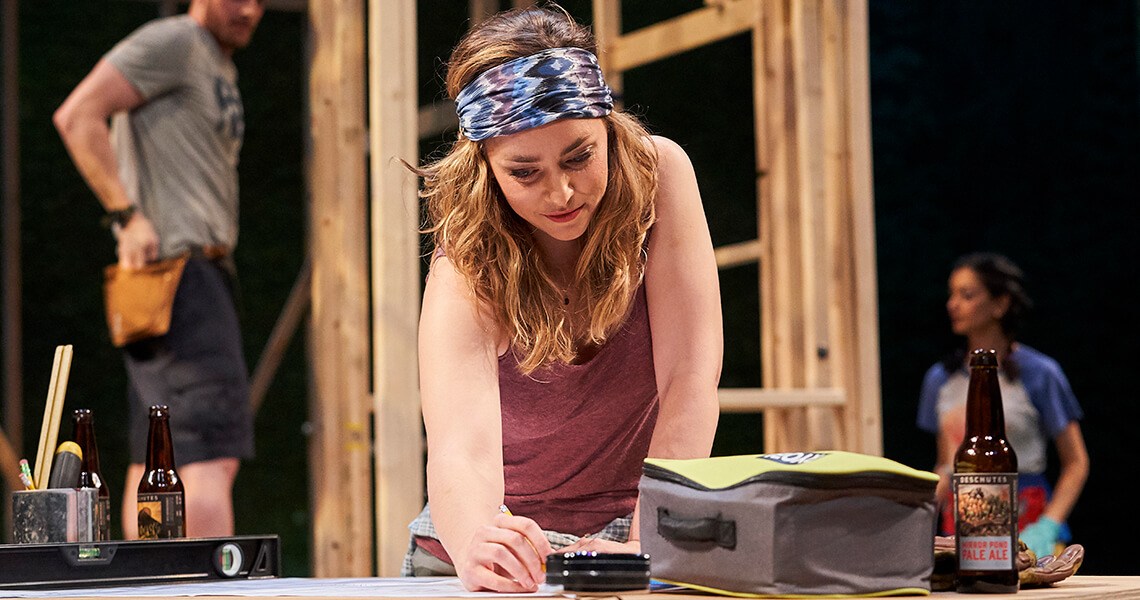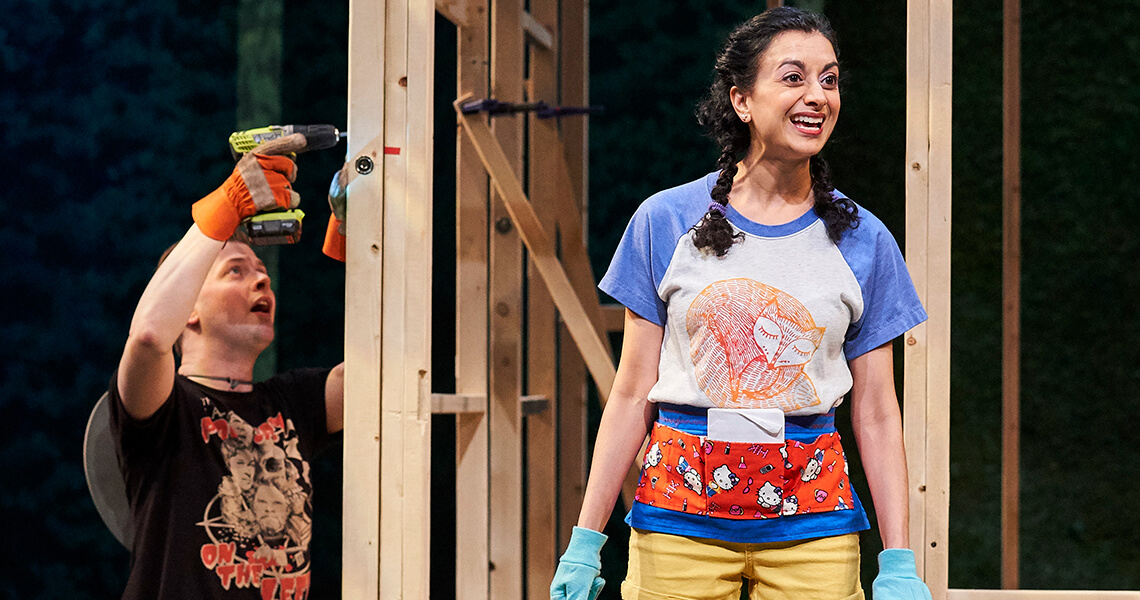Can Tiny Equal Happy?
Apr 17, 2019

Playwright Chelsea Marcantel tells us more about constructing the world premiere comedy Tiny Houses.
 Chelsea is an L.A.-based writer, director, and collaborator. Reared by Cajuns in southwest Louisiana, Chelsea has lived and made theatre among the tribes of the Midwest, Appalachia, the Mid-Atlantic, and now the West Coast. In 2016, she completed a Lila Acheson Wallace American Playwrights Fellowship at The Juilliard School. Her plays, which have been produced across the U.S. and Canada, include Airness, Everything is Wonderful, Tiny Houses, A White Girl’s Guide to International Terrorism, Saint Joan, and Devour. She is currently a member of the inaugural Writers’ Room playwrights’ unit at Geffen Playhouse, and she is working on commissions for two new musicals. As a writer, Chelsea is extremely interested in humans as small-group primates and what happens when the rules and value systems of our chosen groups cease to serve us. She reads a lot of books, watches a lot of documentaries, and listens to a lot of podcasts. Chelsea is an avid self-producer, an enthusiastic member of The Writers Guild of America and The Dramatists Guild, and runs with an amazing group of activists called The Kilroys, who strive for the increased representation of women, non-binary, and trans theatre-makers on every level of the American theatre.
Chelsea is an L.A.-based writer, director, and collaborator. Reared by Cajuns in southwest Louisiana, Chelsea has lived and made theatre among the tribes of the Midwest, Appalachia, the Mid-Atlantic, and now the West Coast. In 2016, she completed a Lila Acheson Wallace American Playwrights Fellowship at The Juilliard School. Her plays, which have been produced across the U.S. and Canada, include Airness, Everything is Wonderful, Tiny Houses, A White Girl’s Guide to International Terrorism, Saint Joan, and Devour. She is currently a member of the inaugural Writers’ Room playwrights’ unit at Geffen Playhouse, and she is working on commissions for two new musicals. As a writer, Chelsea is extremely interested in humans as small-group primates and what happens when the rules and value systems of our chosen groups cease to serve us. She reads a lot of books, watches a lot of documentaries, and listens to a lot of podcasts. Chelsea is an avid self-producer, an enthusiastic member of The Writers Guild of America and The Dramatists Guild, and runs with an amazing group of activists called The Kilroys, who strive for the increased representation of women, non-binary, and trans theatre-makers on every level of the American theatre.

Tiny Houses makes many nods to today’s millennial culture, from blogging to YouTubing to do-it-yourself projects such as the tiny house. What other elements in the story reflect unique, millennial qualities?
I think there’s a real millennial spirit around what qualifies as work for the characters. They’re all disillusioned with white-collar “real” jobs — sitting in an office 40 hours a week pushing paper and not really making or moving anything that feels tangible. There’s a glorification and yearning for manual labor, for meaningful work, that I think a lot of people of this generation feel. There’s also the constant consultation of and comparison to people on social media and the internet that’s a brand-new twist for millennials. You used to be able to compare your life and your choices to your neighbors and your family, maybe a handful of big celebrities — now you can put your life up against that of anyone in the world. It makes for a lot of second-guessing and feeling like there’s a right answer for everything, if only you could find it.
Could you personally live in a 200-square-foot home (roughly the size of a large bathroom)? What challenges or opportunities do you see in doing so?
I could not do it! My books alone would take over the entire place. But I have lived with my husband and large dog in a small one-bedroom apartment in New York City, so I feel I’ve almost been there, spiritually. I am charmed by the idea of going full Marie Kondo and getting rid of a ton of stuff, prioritizing relationships and having lots of outdoor space. But I know myself and I’m too into creature comforts to make it work for long. I need a big kitchen and lots of gadgets. My younger sister lives as a missionary in Tanzania without running water, so I know it’s possible to live much more simply than I do, but I just don’t know that I’d be happy.

Several of the characters in Tiny Houses seem to be experiencing a quarter-life crisis — they are in their 20s or 30s, searching for meaning and trying to decide what kind of person they want to become. Is this a struggle you can relate to, or is it purely fiction?
I can relate to that, but I think I’ve been going through it since I was about 10 years old, and I don’t foresee it stopping. I think we live in a world now of unlimited choice, and every time you come up against a choice, you have the opportunity to decide in some large or small way what kind of person you want to be. Especially today, when we have access to so much information in an instant, the simple act of picking out ketchup at the grocery store now has a political, ethical, human rights component. Or maybe that’s just me and other people who overthink.
Throughout the play, an actual tiny house is being constructed onstage. Why do you feel it is important for the audience to witness this process? What impact do you hope it has?
Whenever possible in the theatre, I like to see actors actually doing a thing instead of making a gesture toward doing the thing. Live theatre is the one entertainment avenue in which we really have the capacity to still be impressed and awed — we just assume anything impressive or magical can happen on television or in the movies, but to see an unexpected thing happening in real time in the same room we’re in, that’s truly wonderful. I think it will be fun and unexpected and impressive, but also, it will give the audience the chance to see visualized what the characters are talking about for the entire play. I’m a visual person myself. You can say “200 square feet” to me and I’ll have no clue what that amount of space feels like. So, why not put it onstage?

To learn more about the Playhouse's production of Tiny Houses, visit our production detail page.
 Chelsea is an L.A.-based writer, director, and collaborator. Reared by Cajuns in southwest Louisiana, Chelsea has lived and made theatre among the tribes of the Midwest, Appalachia, the Mid-Atlantic, and now the West Coast. In 2016, she completed a Lila Acheson Wallace American Playwrights Fellowship at The Juilliard School. Her plays, which have been produced across the U.S. and Canada, include Airness, Everything is Wonderful, Tiny Houses, A White Girl’s Guide to International Terrorism, Saint Joan, and Devour. She is currently a member of the inaugural Writers’ Room playwrights’ unit at Geffen Playhouse, and she is working on commissions for two new musicals. As a writer, Chelsea is extremely interested in humans as small-group primates and what happens when the rules and value systems of our chosen groups cease to serve us. She reads a lot of books, watches a lot of documentaries, and listens to a lot of podcasts. Chelsea is an avid self-producer, an enthusiastic member of The Writers Guild of America and The Dramatists Guild, and runs with an amazing group of activists called The Kilroys, who strive for the increased representation of women, non-binary, and trans theatre-makers on every level of the American theatre.
Chelsea is an L.A.-based writer, director, and collaborator. Reared by Cajuns in southwest Louisiana, Chelsea has lived and made theatre among the tribes of the Midwest, Appalachia, the Mid-Atlantic, and now the West Coast. In 2016, she completed a Lila Acheson Wallace American Playwrights Fellowship at The Juilliard School. Her plays, which have been produced across the U.S. and Canada, include Airness, Everything is Wonderful, Tiny Houses, A White Girl’s Guide to International Terrorism, Saint Joan, and Devour. She is currently a member of the inaugural Writers’ Room playwrights’ unit at Geffen Playhouse, and she is working on commissions for two new musicals. As a writer, Chelsea is extremely interested in humans as small-group primates and what happens when the rules and value systems of our chosen groups cease to serve us. She reads a lot of books, watches a lot of documentaries, and listens to a lot of podcasts. Chelsea is an avid self-producer, an enthusiastic member of The Writers Guild of America and The Dramatists Guild, and runs with an amazing group of activists called The Kilroys, who strive for the increased representation of women, non-binary, and trans theatre-makers on every level of the American theatre.
Peter Hargrave (Bohdi), Kate Eastman (Cath) and Nandita Shenoy (Jevne) in Tiny Houses. Photo by Roger Mastroianni.
Tiny Houses makes many nods to today’s millennial culture, from blogging to YouTubing to do-it-yourself projects such as the tiny house. What other elements in the story reflect unique, millennial qualities?
I think there’s a real millennial spirit around what qualifies as work for the characters. They’re all disillusioned with white-collar “real” jobs — sitting in an office 40 hours a week pushing paper and not really making or moving anything that feels tangible. There’s a glorification and yearning for manual labor, for meaningful work, that I think a lot of people of this generation feel. There’s also the constant consultation of and comparison to people on social media and the internet that’s a brand-new twist for millennials. You used to be able to compare your life and your choices to your neighbors and your family, maybe a handful of big celebrities — now you can put your life up against that of anyone in the world. It makes for a lot of second-guessing and feeling like there’s a right answer for everything, if only you could find it.
Could you personally live in a 200-square-foot home (roughly the size of a large bathroom)? What challenges or opportunities do you see in doing so?
I could not do it! My books alone would take over the entire place. But I have lived with my husband and large dog in a small one-bedroom apartment in New York City, so I feel I’ve almost been there, spiritually. I am charmed by the idea of going full Marie Kondo and getting rid of a ton of stuff, prioritizing relationships and having lots of outdoor space. But I know myself and I’m too into creature comforts to make it work for long. I need a big kitchen and lots of gadgets. My younger sister lives as a missionary in Tanzania without running water, so I know it’s possible to live much more simply than I do, but I just don’t know that I’d be happy.

Michael Doherty, Nandita Shenoy (Jevne) and Kate Eastman (Cath) in Tiny Houses. Photo by Roger Mastroianni.
Several of the characters in Tiny Houses seem to be experiencing a quarter-life crisis — they are in their 20s or 30s, searching for meaning and trying to decide what kind of person they want to become. Is this a struggle you can relate to, or is it purely fiction?
I can relate to that, but I think I’ve been going through it since I was about 10 years old, and I don’t foresee it stopping. I think we live in a world now of unlimited choice, and every time you come up against a choice, you have the opportunity to decide in some large or small way what kind of person you want to be. Especially today, when we have access to so much information in an instant, the simple act of picking out ketchup at the grocery store now has a political, ethical, human rights component. Or maybe that’s just me and other people who overthink.
Throughout the play, an actual tiny house is being constructed onstage. Why do you feel it is important for the audience to witness this process? What impact do you hope it has?
Whenever possible in the theatre, I like to see actors actually doing a thing instead of making a gesture toward doing the thing. Live theatre is the one entertainment avenue in which we really have the capacity to still be impressed and awed — we just assume anything impressive or magical can happen on television or in the movies, but to see an unexpected thing happening in real time in the same room we’re in, that’s truly wonderful. I think it will be fun and unexpected and impressive, but also, it will give the audience the chance to see visualized what the characters are talking about for the entire play. I’m a visual person myself. You can say “200 square feet” to me and I’ll have no clue what that amount of space feels like. So, why not put it onstage?

Kate Eastman (Cath) and Peter Hargrave (Bohdi) in Tiny Houses. Photo by Roger Mastroianni.
Your plays often examine what happens when rules, value systems and — particularly in Tiny Houses — relationships cease to serve us. Tell us a little more about this idea and what inspires you to write about it.
To learn more about the Playhouse's production of Tiny Houses, visit our production detail page.